Science fiction and fantasy have been around for centuries. Millennia, depending on which criteria you prefer. Only in the twentieth century did they coalesce into the genre-spectrum they are today, and begin to win large-scale popular and commercial success.
But humans forget. Here are five books by a mere sampling of the writers from the recent past whom we must not forget.
Jirel of Joiry by C. L. Moore
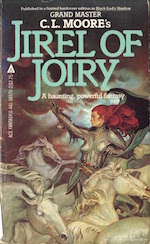 Catherine Lucille Moore (1911-1987) had to use her gender-neutral initials to get published in the 1930s. That didn’t stop her creating the fledgling genre of sword and sorcery’s first female protagonist in Jirel of Joiry. As brave, capable, and arrogant as any man, yet far from invulnerable, Jirel was more than just a red-haired, female Conan. While her adventures were clearly influenced by Robert E. Howard, as well as by Moore’s and Howard’s literary acquaintance H. P. Lovecraft, they focus less on her sword-swinging than her spirit and furious determination. A curious blend of compassion and cruelty, she’s a pious Catholic who’ll risk damnation to gain the means to overcome her foe—then brave the very Hell she sent him to, to free his soul from eternal suffering.
Catherine Lucille Moore (1911-1987) had to use her gender-neutral initials to get published in the 1930s. That didn’t stop her creating the fledgling genre of sword and sorcery’s first female protagonist in Jirel of Joiry. As brave, capable, and arrogant as any man, yet far from invulnerable, Jirel was more than just a red-haired, female Conan. While her adventures were clearly influenced by Robert E. Howard, as well as by Moore’s and Howard’s literary acquaintance H. P. Lovecraft, they focus less on her sword-swinging than her spirit and furious determination. A curious blend of compassion and cruelty, she’s a pious Catholic who’ll risk damnation to gain the means to overcome her foe—then brave the very Hell she sent him to, to free his soul from eternal suffering.
And you’ll never catch Jirel in a mail bikini. She wears the same practical armor as any other warrior of her unspecified Medieval period would.
Moore’s writing is brisk, strongly sensory, and evocative of settings Earthly and alien, though flavored with a few too many adjectives for the modern palate. She had a long and successful career with Jirel and the space opera adventures of Northwest Smith, then writing in collaboration with her husband, Henry Kuttner. Jirel of Joiry is a collection of most of the Jirel tales.
The Planetary Adventures of Eric John Stark by Leigh Brackett
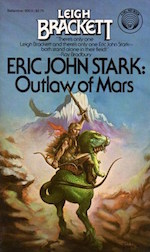 While you may not have heard of Leigh Brackett (1915-1978), you’ve heard of her screenwriting work. Maybe not The Big Sleep or Rio Lobo, but how about The Empire Strikes Back? While the final script is credited to Lawrence Kasdan, her influence on what’s widely considered the best of the Star Wars films is marked – here’s a great vindication of her contribution to it by Charlie Jane Anders.
While you may not have heard of Leigh Brackett (1915-1978), you’ve heard of her screenwriting work. Maybe not The Big Sleep or Rio Lobo, but how about The Empire Strikes Back? While the final script is credited to Lawrence Kasdan, her influence on what’s widely considered the best of the Star Wars films is marked – here’s a great vindication of her contribution to it by Charlie Jane Anders.
A vigorous, proficient writer who, like Moore, brought depth to her swashbuckling characters, Brackett wrote space opera at a time when it was widely disdained, even among fellow SF writers, as “mere pulp,” simply because she wanted to. “I suppose most of my stuff would be called escape fiction,” she said. “This is the type of stuff I love to read.” Which goes for me as well.
Indeed, the reason George Lucas called Brackett in to work on Empire—aside from the fact he thought she was a man—was not her prior film success, but because of her “pulp science fiction” stories. These were strongly influenced by Edgar Rice Burroughs’ “planetary romances” like the Barsoom series, and often starred this collection’s protagonist, Eric John Stark.
The Dragon Masters by Jack Vance
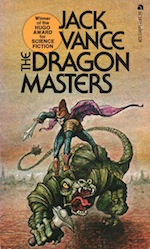 Jack Vance (1916-2013) is my favorite writer. Vance was a master stylist, whose remarkably rich descriptions, often picaresque characters, wry perspective, and unmatched ability to portray bizarre yet believable cultures, human and alien (his years spent traveling the world as an able seaman in the Merchant Marine may have something to do with that), gave him a powerful, distinctive voice.
Jack Vance (1916-2013) is my favorite writer. Vance was a master stylist, whose remarkably rich descriptions, often picaresque characters, wry perspective, and unmatched ability to portray bizarre yet believable cultures, human and alien (his years spent traveling the world as an able seaman in the Merchant Marine may have something to do with that), gave him a powerful, distinctive voice.
The Dragon Masters is a novella, sometimes sold bound as a book, which won the 1963 Hugo for Best Short Story. It’s classic space opera adventure, with Vance’s unique twist. Like much of his fiction it’s a rumination on human nature, with its quirks, virtues, extravagant vices, and malleability, shown directly and mirrored by aliens and humans’ interactions with them. “Dragon Masters” takes “malleability” literally, pitting human defenders against reptilian alien invaders on a far-off world, both sides fielding armies of specially-bred, monstrous versions of … each other. Its protagonist Joaz Banbeck, like many of Vance’s, is far from a spotless paladin. But despite his grey areas, he fights the good fight with wit and courage as well as compassion.
The Dragon Masters was also a key inspiration for and influence on my own Dinosaur Lords fantasy novels…
Berserker (Berserker Series Book 1) by Fred Saberhagen
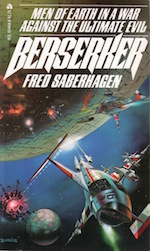 red Saberhagen (1930-2007) was a quiet, gracious man. He was also a friend, who with his wife, author Joan Spicci Saberhagen, entertained much of the New Mexican SF/F creators’ community at parties celebrating Edgar Allan Poe’s birthday. A master storyteller, he wrote a large number of novels and stories which spanned horror (The Dracula Tapes) and fantasy (The Books of Swords.) But he’s best known for his science fiction stories of the Berserkers—autonomous, intelligent killing machines hell-bent on ridding the galaxy of life.
red Saberhagen (1930-2007) was a quiet, gracious man. He was also a friend, who with his wife, author Joan Spicci Saberhagen, entertained much of the New Mexican SF/F creators’ community at parties celebrating Edgar Allan Poe’s birthday. A master storyteller, he wrote a large number of novels and stories which spanned horror (The Dracula Tapes) and fantasy (The Books of Swords.) But he’s best known for his science fiction stories of the Berserkers—autonomous, intelligent killing machines hell-bent on ridding the galaxy of life.
A champion of courage and compassion, with a strong moral center and a dry sense of humor, Saberhagen wrote gripping tales of the Berserker-human war in which he not only encompassed human foibles, but used them as strengths to combating the implacably hostile machines. The stories have been massively influential on science fiction, echoed by Star Trek’s Doomsday Machine (although episode writer Norman Spinrad based it on his own unpublished work, related works like The Star Trek Concordance call the Machine a “Berserker”) Battlestar Galactica’s Cylons, Mass Effect’s Reapers, and Skynet from the Terminator movies.
Berserker stories also helped hook me on SF as a child.
Happily these stories of murder-robots who turned on their creators have no relevance today, since it’s not as if DARPA is actively trying to develop autonomous killing machines. Oh, wait…
Lord of Light by Roger Zelazny
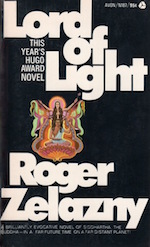 To me, Roger Zelazny (1937-1995) is SF/F’s greatest author, and Lord of Light is my favorite novel. Like Fred Saberhagen, Roger was a friend, a fellow New Mexican, and an all-around good guy. He was also a contributor to George R.R. Martin’s Wild Cards shared-world anthologies, as am I.
To me, Roger Zelazny (1937-1995) is SF/F’s greatest author, and Lord of Light is my favorite novel. Like Fred Saberhagen, Roger was a friend, a fellow New Mexican, and an all-around good guy. He was also a contributor to George R.R. Martin’s Wild Cards shared-world anthologies, as am I.
Deliberately blending fantasy and science fiction, Lord of Light is a beautiful, sprawling in scope yet tightly constructed grand adventure, with compelling and surprising characters, and technomagical settings so fantastic that, when a movie based on the novel was proposed in 1979, the filmmakers brought in comic book artist-god Jack Kirby to design the sets. (Asgard, in the MCU Thor movies? That’s Kirby’s vision, brought brilliantly to the screen.) The novel explores the nature of power, faith, and enlightenment – and the uses and misuses of both – with the heart and irreverent wit that marked Zelazny’s multifarious and multi-Hugo and Nebula-winning body of work.
Sadly, the Seventies movie never came about. But a fake production of it, renamed “Argo,” was used as cover for the “Canadian Caper” rescue of six US diplomats during the Iranian hostage crisis. And, yes, that’s the basis for 2012’s Best Picture Oscar winner, Argo.
Roger’s risk of being forgotten may drop precipitously if the proposed TV adaptation of Lord of Light comes to pass. But please, read this and other works by him, Moore, Brackett, Saberhagen, Vance, and other past writers—and keep our genre’s history alive.
 In previous worlds Victor Milán has been a cowboy and Albuquerque’s most popular all-night prog-rock DJ. The Dinosaur Princess, book 3 in The Dinosaur Lords series, is available now from Tor Books. He’s never outgrown his childhood love of dinosaurs, and hopes you didn’t either.
In previous worlds Victor Milán has been a cowboy and Albuquerque’s most popular all-night prog-rock DJ. The Dinosaur Princess, book 3 in The Dinosaur Lords series, is available now from Tor Books. He’s never outgrown his childhood love of dinosaurs, and hopes you didn’t either.










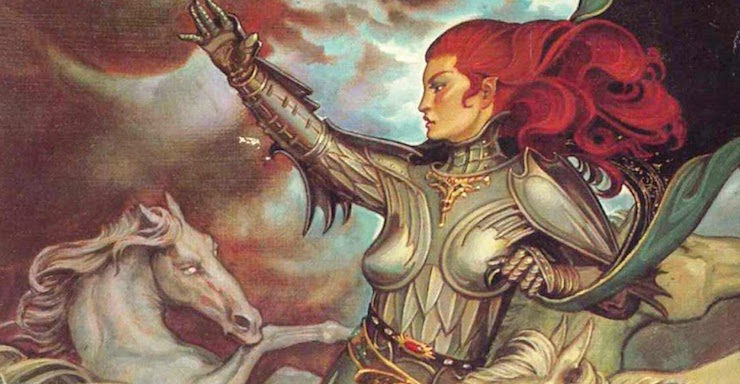
Wow, this is the first time I’ve ever agreed with all of the entries in the list. Victor, you’ve made me much more likely to try the Dinosaur Lords now!
Authors on this list I have not forgotten: also 5 out of 5.
Jirel may not have worn impractical armor—as written—but the armor depicted by the cover artist is just as impractical as a mail bikini!
Great list. And you remembered Roger Zelazny!!!!!!! The only thing I have to disagree with (& I know it’s unpopular) is “Lord of Light” is good but “Night in the Lonesome October” is still my favorite. And his short stories are even better, Last Defender of Camalot still brings tears to my eyes, and the anthology “The Doors of his Face, The Lamps of his Mouth” is just….perfect. Not only is the title story great but there’s not a bad one in the whole book.
In the current TV environment, with Game of Thrones, American Gods and all the other epic fantasy being pursued, I really really want Zelazny’s Amber to get picked up by someone good.
Dragon Masters is an old favorite of mine as well. I may have to look up Brackett and Moore, while I was aware of Brackett (due to Empire primarily) I don’t think I’ve read any.
All great choices! (Well, I’m not sure how much Berserkers I’ve actually read, but I was aware of the series when I was growing up, and I did read a bunch of other Saberhagen.)
Now if we could just get more Zelazny rereleased as eBooks …
Some of my favorites, especially Jack Vance. I would also recommend Samuel Delany, Alfred Bester and Damon Knight(mainly his short fiction).
#6 I would give a great good deal to get Zelazny’s “other” works in audio format. Madwand; Doorways in the Sand; Dilvish the Damned!
Life long fan of Beserker series. Adventure, death machines, and morality issues addressed through “GoodLife” characters, along the lines in the TV series The Colony narratives.
I’ve read CL Moore’s work, but not Jirel of Jorey. Will have to check it out. I also think, while I’ve read a lot of Vance, that I missed The Dragon Masters. The other three books are all personal favorites. Good list!
Jirel of Joiry has always been my favorite sword & sorcery… ummm. hero? I don’t recall when I first encountered her, except that it was sometime in high school. She was the first female heroic character I had ever encountered, and is still a favorite. The cover may be typically silly, but inside the book, Jirel always wore armor made to fit, and made for fighting.
Five excellent suggestions here. In a truly just world all five authors would have hard bound editions of their complete works in every public library in the land (printed on acid free paper of course to preserve them for future generations).
A couple of comments: for Leigh Brackett I would strongly recommend both her classic planetary epics (“The Secret of Sinharat” and “The People of the Talisman” are two titles that spring to mind out of many) and her later Skaith novels when she sent her hero Eric John Stark interstellar (“The Ginger Star”, “The Legion of Skaith” and “The Reavers of Skaith”). All too often when an author revives an old series the result is a creaky disappointment. Not with Leigh Brackett. Any author who can still produce hammer stroke lines like: “I am N’Chaka! I do not die, I kill!” is still at the top of her game.
As for Jack Vance, he wrote many, many more good books than I have time to list here. For series I would recommend his “Tschai” series (aka The Planet of Adventure). Adam Reith is a scout stranded on a planet controlled by four alien races each of whom has its own human slave race. Plus a myriad of cultures of various human mutants. So Reith has to escape back to Earth. And while he works on that, he introduces some elements of civilization to Tschai. A key lesson: Humans are not prey. Another very good series: The Demon Princes novels. One stand alone novel I would particularly recommend is “Emphyrio”.
By the way, all of Jack Vance’s works are available in ebook editions (at rather reasonable prices) at the Jack Vance Website.
I would keep raving on but this comment is already rather too long.
All excellent choices but I’d suggest one more.
John M “Mike” Ford. https://en.wikipedia.org/wiki/John_M._Ford
He was easily the match of all the people on this list.
If nothing else, you owe it to yourself to read “The Dragon Waiting” (the best alternate history fantasy I’ve read), “The Final Reflection” (the best Star Trek novel) & “The Princes of the Air” (an exquisite space opera).
One nice thing about this list is that all the authors did much of their work for magazines other than Analog/Astounding (not saying they didn’t do anything for that magazine, but a lot of their work appeared elsewhere). People putting together histories of SF often put John Campbell and his stable of writers at the center of the story, which emphasizes a certain “house style,” and is a narrow way of looking at a field that has been incredibly diverse. As a lifelong Analog reader, my own view of SF has always been heavily influenced by the magazine, but I have always appreciated what I have found when I explore the works of authors who “colored outside the lines” of the Campbell style.
http://www.lordoflight.com/
My favourite SFF book that was forgot is Islandia by Austin Tappan Wright; so forgotten, it’s out of print now. And if you’re going to mention Zelazny (who I don’t personally think is being forgotten), then I’ll mention I’m beginning to feel like Robert Silverberg’s world of Majipoor is slipping into the ether unjustly.
longstrider @5:
In the current TV environment, with Game of Thrones, American Gods and all the other epic fantasy being pursued, I really really want Zelazny’s Amber to get picked up by someone good.
Hear! Hear! I, too would love to see that happen. So many great characters to write dialogues for.
Historically, I like to think of the demarcation point for fantastic literature as Frankenstein. Before Frankenstein (BF), there was no clear distinction between realistic and fantastic literature. After Frankenstein (AF), with the advent of the industrial revolution, the distinction began to be made that led to the break between “serious” realistic literary fiction and “unserious” fantastic genre fiction. I’m heartened that those distinctions have started to break down over the last twenty years.
Bravo on mentioning Vance who is my favorite writer also. C.L. Moore is another fav of mine as is Leigh Brackett. Nice list.